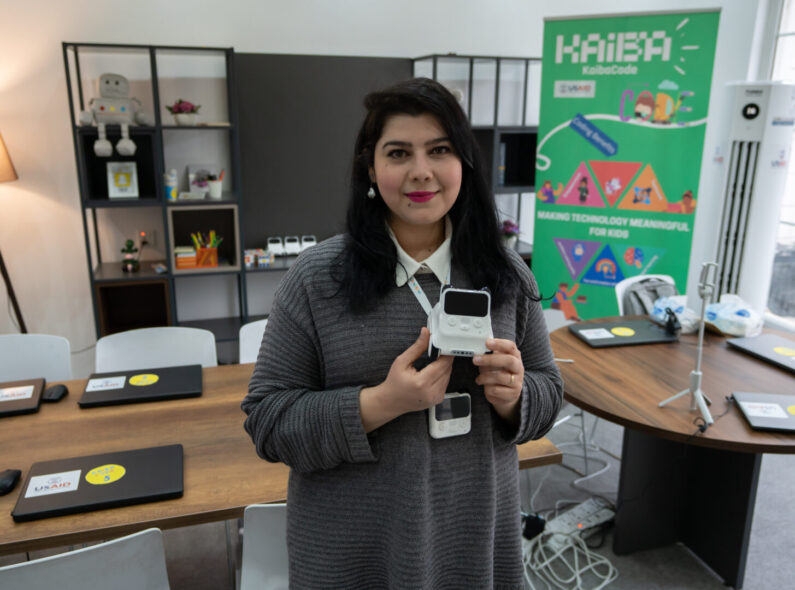
Empowering Young Women to Bridge the Gender Digital Divide
March 8, 2023 | 5 Minute ReadAccess to the internet alone, while important, cannot guarantee an equally engaging, value-creating, equitable representation in the digital era.
The gender digital divide maintains the dichotomous status quo of the world as women are not able to reap the dividends of participation in the digital world. Empowering youth, and especially young women to meaningfully engage with technology is a critical part of the solution to close the gender digital divide. Besides youth being overall more connected than the rest of the population, studies show that young women are especially motivated to choose technology careers due to the potential to solve societal challenges. With technology as the key to accelerating achievement of the SDGs, young women should be at the forefront of this journey.
Unpacking the digital divide
Digital divide affects both men and women, but women are more directly impacted, especially in some of the countries and communities where we work. While globally women are 23% less likely than men to use mobile internet, in South Asia this gap was as high as 58% (2019). The broadband commission finds that the gender digital divide is widest in countries where mobile connectivity is lowest. In countries with lower access to the internet, both men and women grapple with economic hurdles which make it difficult to have access to a smart device, and consequently to mobile internet. But for women, economic difficulties intertwine with socio-cultural and institutional barriers, regarding women’s roles in society and normative educational, career paths and security. The impact on women is multifold:
- Access to Services: Lower connectivity means lower or no access to financial services which inhibits women from their financial independence and their ability to innovate and to put forward women-led businesses.
- Digital Access & Protection: Women are isolated from important information that impacts their health and security, especially when located in remote areas, or when experiencing displacement in natural shocks or conflict contexts.
- Digital Literacy: Lower access to connectivity means lower access to education and missed opportunities for upskilling and reskilling, whether formally or not, in an increasingly digital labor market.
By comparison, statistics show that youth are more connected and in 2020, youth (15-24 years old) were 1.24 times more likely to be using the internet compared to the rest of the population. Having grown up in a digital age, youth are quick to adapt, learn and engage in the digital ecosystem, as their lives are constantly shaped by digital technologies. Youth integration in the digital workforce is contemporaneous and inevitable. According to the ILO Global Employment Trend for Youth 2022, the digital market promotes employment of youth (15-29 years old), as they are more likely to seek online work and to earn more than their older peers.
Leveling the Playing Field: Access to Services
High on the UN agenda is the commitment to connect the unconnected – addressing disproportionate access and engagement for underserved communities. Global support on connectivity could have immense implications for human capital development, including improving equity for women and youth. By 2030, this alone could result in the creation of 24 million new jobs, with 6.4 million of these reserved for young people. We can advance gender equality by consciously and intentionally addressing equity in burgeoning sectors where the growth potential is high – by increasing the talent pipeline through access to quality education and vocational training and promoting women in positions of leadership, serving as role models in traditional male dominated sectors – such as Information and Communication Technology (ICT) and Science, Technology, Engineering and Mathematics (STEM).
Youth programming should aim at leveling the playing field and increasing meaningful engagement of youth, especially young women, with technology. Understanding the inextricability of digital transformation with quality, accessible education, USAID Tunisia JOBS, a project implemented by Chemonics, works to leverage Tunisia’s talented young women and men in the technology field. The project partnered with several employers in the financial market sector, to establish a fintech master’s program, precede digital market needs and increase young women’s enrollment. Additionally, Tunisia JOBS empowers women as innovators by providing technical support to drive inclusive technological solutions, to create role models for young women in the technology space which defy stereotypes and normative expectations from women.
Keeping Women Safe: Digital Access & Protection
Increasing digital access among young women globally has been a catalyst for digital solutions that advance protection in hard-to-reach areas. In 2020, 3.7 billion people did not have access to internet, a staggering figure considering the social, economic and political transformation that the digital era brings. Having digital access and the knowledge to use it best has implications in closing not just economic and social gaps, but also advancing protection and safety nets for women.
In response to these barriers, especially the security of young women in a digital age, the Ellas App, an application initially developed by an alliance of civil organizations in Colombia, and updated by the USAID Colombia Justice for a Sustainable Peace activity (JSP) is leveraging technology as a tool to reduce and prevent violence against women, especially among young women in rural areas. Data from Demographic Health Survey show that in 2015, in Colombia 80% of women ages 15-49 have experienced gender-based violence (GBV) during their lifetime and 93% of women experience sexual violence before age 18. The app offers quality information on accessing justice systems, increases awareness on forms of violence and promotes pathways against GBV. The Ellas App, is free and can be used offline, addressing the connectivity issue for many women living in rural areas, preserves confidentiality, and is introduced in a context where rates of GBV are considerable. From March 2020- February 2021, the app registered 15,000 downloads.
Empowering Generations: Digital Literacy
With the pace of digitalization, and its effects in every aspect of our lives, digital access becomes a fundamental human right, and digital literacy an essential 21st century skill. Ensuring equity in the digital revolution means that diverse youth in terms of gender, race, ethnicity, disability, sexual orientation, and gender identity/expression have access to, benefit from and actively participate in the digital transformation.

That’s why the USAID Iraq Durable Communities and Economic Opportunities (DCEO/Tahfeez), is supporting young Iraqi entrepreneurs to expand digital literacy and opportunities through incubation and in-kind grants to accelerate the growth of their businesses. The entrepreneurship story of Zhela, a young software engineer, born and raised in Iraq, illustrates the potential of young women to drive development and innovation, when empowered to do so. Returning from an inspiring experience as a children’s coding instructor in the US and realizing how little exposure children in Iraq were having to technology and coding, triggered Zhela’s desire to address this gap. The project supported her in bringing this idea to fruition through an incubator program that led to the foundation of KaibaCode.
On this International Women’s Day, and beyond, the development community should further our resolve to support women to play an active role in closing the overall gender digital divide to advance gender equality. Increasing young women’s meaningful participation in the digital world is not a panacea for achieving gender equality – and should go hand in hand with addressing structural and normative barriers that inhibit women’s equitable participation in society. Providing young women with the resources, skills, and opportunities to increase their digital access, protection and literacy positions them to lead transformation within their communities and advance gender equality for generations to come.
Posts on the blog represent the views of the authors and do not necessarily represent the views of Chemonics.
